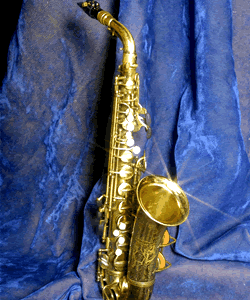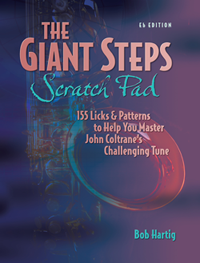(Continued from part 4.)
 Over thirty years have passed from the days of God’s Family Band until today. Dad’s horn has been a constant companion in that journey, though I have not always been constant with it. There were times when I set it aside for a season, and other times when I thought how much simpler life could be if I put it behind me forever. Yet every time I have set down the saxophone, I have returned to it. I have kept at it–because I must. It is more than a passion; it is a calling, integral to the way God has designed me.
Over thirty years have passed from the days of God’s Family Band until today. Dad’s horn has been a constant companion in that journey, though I have not always been constant with it. There were times when I set it aside for a season, and other times when I thought how much simpler life could be if I put it behind me forever. Yet every time I have set down the saxophone, I have returned to it. I have kept at it–because I must. It is more than a passion; it is a calling, integral to the way God has designed me.
There are many other stories besides the ones I have told in this brief series, more than I wish to share here. The long and short of it all is, Dad’s horn has shaped me both as a player and as a person.
Thus far, I have talked about the journey my father’s horn has taken me on. Now I would like to tell you a little about the horn itself. I own two other saxophones beside it: a Conn tenor that is even older than my alto and has long been in drastic disrepair, and a Yamaha soprano that I sometimes play. But the alto remains my voice, and I have always owned only the one, Dad’s. I’ve had no need for any other.
Not that I haven’t tried other horns. I’ve sampled a fair cross-section of altos over the years. But the one I learned to play on is the one I play today and the one on which I will someday play my last note, and then, I hope–though I have no children of my own–pass it on to someone else as a legacy, just as Dad passed it on to me.
Of all the saxophones I have played, my father’s horn sounds the most resonant, offers the greatest flexibility of sound, and blows the freest. It is an amazingly open horn. It will take as much air as I can supply and convert it into a sound that fills a room. Not that the Conn 6M is a miracle horn; it has its drawbacks. While I can get around reasonably well above high F, the altissimo is not as responsive as on other saxophones. Manufactured before the introduction of the high F# key, Dad’s sax does not feature uber-high notes as one of its strengths. Also, my repairman tells me that the rolled tone holes–a hallmark of the 6M–are beastly when it comes to getting pads to seat properly. When I have pads replaced, I usually need to visit the shop more than once to get the sax sealing tightly.
But once that job is accomplished, oh, man! Dad’s alto is a dream to play, and I fall in love with it all over again. It has a sound and a response like no other, and it has served me well for over four decades.
Dad was always the greatest fan of my playing. During the last three years of his life, he, like me, had an encounter with Jesus that changed him–not a little, but drastically. The anger that seemed to lurk below the surface disappeared, and while his feistiness remained, it was tempered with humility, even a sweetness, and above all, a peace I had never seen in him before. The ghosts that I think had haunted him from World War II seemed to lose their grip. There is a verse in the Bible that reads, “If anyone is in Christ, he is a new creation. Old things are passed away; behold, all things are become new.” (II Cor. 5:17) Whenever I read that verse, I think of Dad.
I was 28 years old when Dad passed away. That was nearly thirty years ago. Several years ago, I wrote a letter to my father. I thanked him for all he had done for me and for our family. I told him how, now that I was older and wise enough not to know as much as I did back in my twenties, I wished I could sit down with him and listen to him tell me about his life–how it was in the Great Depression, and in the War, killing and watching his friends be killed. I told him that he was my hero, and how glad I was, how very glad, for the peace he had found. The transformation that had begun in him when he first encountered the Lord was now complete. When next he and I would meet, Dad would no longer be a white-haired man crippled by a back injury, short-winded from a chronic heart condition and breathing from an oxgyen tank. I envisioned him striding toward me, grinning, his arms outstretched, his face that of a vibrant young man, his eyes filled with a spark that can only be found in one who has looked into the very face of Love and Life, and in its Presence found his home.
On Memorial Day, I took my letter to the small cemetery out in the countryside where Dad is buried. A tiny American flag fluttered by his marker beneath a tall fir tree. It is a beautiful little place, and Dad, who loved trees, would have been pleased with the location. I cleared away a few sprigs of grass that were encroaching on his modest gravestone, and I dusted off its surface. With a piece of Scotch tape, I attached my letter to Dad’s marker.
Then, standing up, I fulfilled one last, important part of the letter. “Thanks for the saxophone, Dad,” I had written. “It was your legacy to me, and I’ve brought it with me. Perhaps, just for a minute, the Lord will roll back eternity and let you get an earful of me playing it just for you.”
Taking the horn, setting its mouthpiece in my mouth, and wrapping my fingers around the golden, pearl-covered keys that I had first seen and admired when I was a little boy, I began to play. With his old Conn alto sax, I played for Dad the song I had performed on the day when I was baptized at Bethel–the song that over the years had become my theme song and was a fitting description of Dad’s own life.
Amazing grace! How sweet the sound that saved a wretch like me.
I once was lost, but now I’m found; was blind, but now I see.
A saxophone cannot verbalize those words, but it most certainly can communicate them. That day, I played them with all my heart.
Through many dangers, toils, and snares I have already come.
‘Twas grace that brought me safe this far, and grace shall lead me home.
The legacy of my father’s horn lives on. I love to play it, and while I am no Kenny Garrett, I continue to practice regularly, and thus to grow as a jazz musician. Today, I realize that Dad’s gift to me of his saxophone was ordained by my heavenly Father–by my father’s Father and mine. I am his son, his man, and his musician. And with gratitude, until a day known only to him when my last song shall end, by his grace, for his pleasure, and in honor of the Master Musician, I will continue to play my Father’s horn.

